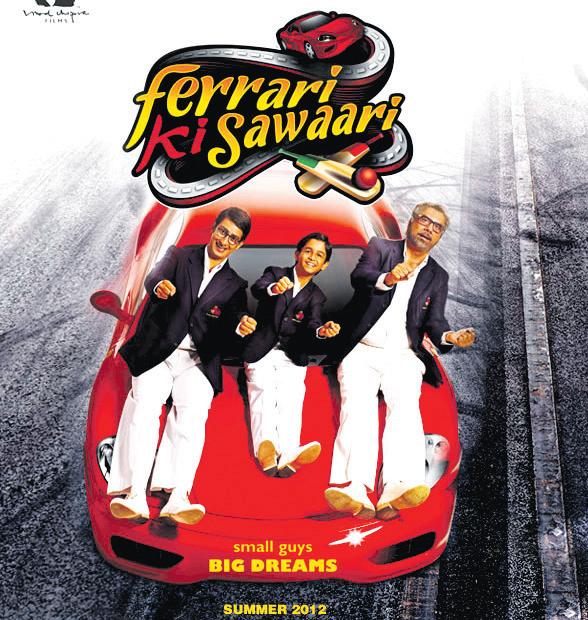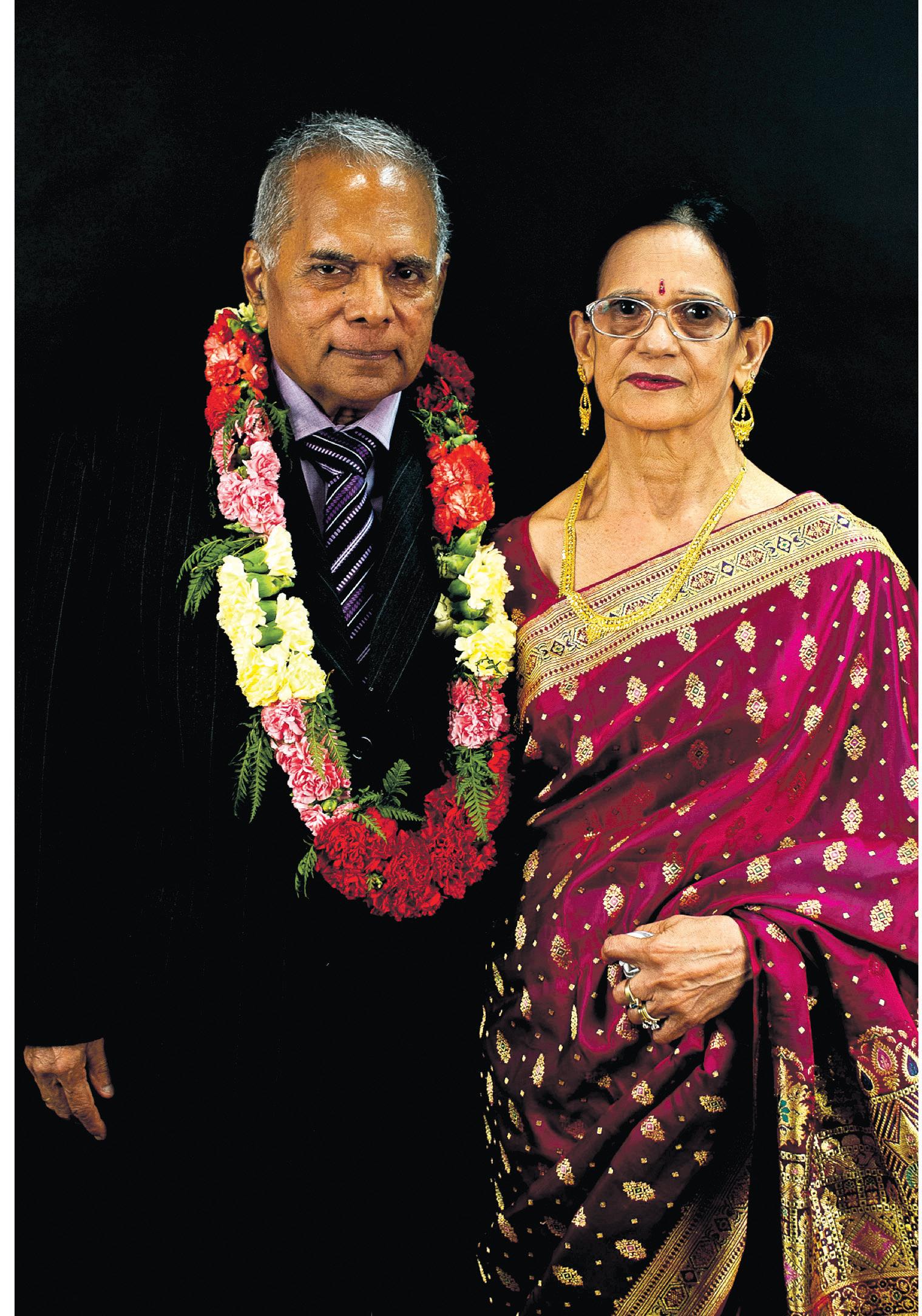
16 minute read
The fire still burns at 80
from 2012-06 Sydney (2)
by Indian Link
BY ASHA CHAND
Harish Sharma, the first Indian to hold top office in Fiji as deputy Prime Minister in the Bavadra government in 1987 – the year that reshaped Fiji’s destiny, celebrated his 80th birthday in Sydney recently with the hope that Fiji will recover from its deep political and social fractures, both direct results of the military coup that ousted his government from office.
Calling Australia his adopted country, Mr Sharma feels liberated living in a country that offers him his basic human rights as well as recognizes his Indian identity. He was also President of Fiji’s largest Hindu organisation, the Shree Sanatan Dharam Pratinidhi Sabha.
Advocating politics of inclusiveness, Mr Sharma said Fiji has turned back a full circle into the doldrums while playing the race card. “Indians who have been feared and accused of taking over the education and economy of the country have been forced to look outside the box,” stated Sharma. “In doing so, they have been exposed to global markets in countries like Australia, New Zealand, the US and Canada, and they utilized their education and skills to migrate and establish a better life. The coup was a turning point in this community’s livelihood. They have soldiered on while our indigenous Fijian communities have been left behind, fooled into believing that claiming ownership over land and letting it lie barren would get them something in return”.
“This ideology has been an end in itself,” he continued. “One has to make use of every resource available to survive and indeed flourish in this day of competition and open markets. Any ordinary citizen can zoom into the crisis crippling Fiji to understand that those who played the race card have long deserted the country”.
So what would he do if he were given another chance?
“While Fiji’s constitution is being redrafted, I would ensure that the country has a representative government, voted on Common roll,” said Mr Sharma emphatically. “This would be a good political philosophy which would bring about political and social integration. Fiji needs fair representation of all its citizens through one man: one vote and one value”.
“I am optimistic and know how resilient the ordinary people of Fiji are,” added Mr Sharma.
Speaking about the Fiji Indian community in Sydney, Mr Sharma lamented that it has not ventured outside its own boundaries to assimilate into the multicultural environment. “The community is keeping to its old cultural and class system of networks within its comfort zone. This is not a healthy way to live, given that we are now in a multicultural space. The concept of operating Ramayan madalis is keeping the community locked in. Our great grandfathers introduced the concept of Ramayan recital to keep the religion and culture alive. We now have the capacity to read and study the teachings espoused in these holy books, but why are we using such excuses not to go out and see the world outside of the Fiji Indian community?”
He said there was a constant struggle in the community to keep abreast of one another. “As an uprooted group, we are always going to live in flux,” he observed. “Competition is good, but only to a point. We live in a cut-throat world of ‘I must be better than the others in my social group’. The competition goes beyond self to include children and our aspirations to educate them for careers they may not even be happy to take up. The extended family unit is fast fading away as we feel the pressures of time and space. Elderly parents and grandparents are lost in this tide of change as they have not been able to adapt their thinking to the new trends of nuclear families. Many migrate through chain migration, only to become a part of another vicious cycle”.
“By socialising within their own Indian networks, the community is unconsciously reinforcing bad habits. I do not believe in isolation - we should not be creating a country within a country. Our isolation in the past (in Fiji) was created by the colonial government. Now we are better educated and exposed to opportunities to learn and grow from the experiences of other communities. We should take on this new challenge and liberate our thinking and behaviour,” added Mr Sharma vehemently.
Mr Sharma occasionally discourses on the basics of living a well balanced and happy life based on the teachings of the Holy Ramayan, at the Lyn Parade temple in Liverpool. Here he stresses that we must read the holy books as sources of knowledge, rather than organise recitals where the real meaning is lost in excessive socialising (yagona drinking among men) and fashion parades by women decked in finery as if they are at a Bollywood fashion show.
Harish Sharma was born in Nausori, Fiji in 1932. He worked as an insurance agent and a civil servant before taking up studies at the University of Tasmania in 1960, graduating with a Bachelor of Law (LL.B) in 1964. Upon returning to Fiji he worked for the country’s two senior most Indian politicians: Sidiq Koya and AD Patel, both of whom had led the Indian-dominated National Federation Party as tough opposition to the Alliance Party which ruled from 1966 to 1987, led by Fijian chief Ratu Sir Kamisese Mara, the founding father of modern Fiji.
The party was finally toppled by a multi-racial coalition led by Dr
Timoci Bavadra, an ethic Fijian who drew majority support from the Indian communities. However, the Bavadra government in which Sharma was deputy Prime Minister was deposed in a military coup 33 days later, on May 14, 1987. In that year Mara returned to power, the Alliance Party was dissolved and the role of chiefs in Fiji’s politics took a new turning point.
Mr Sharma set up his own law firm in 1969 and continued his involvement in politics, contesting seven elections without losing any. He retired from politics in 1998 and became a life member of the Fiji Law Society in 2007. In August 2001, Mr Sharma was appointed an Officer of the Order of Fiji.
Addressing a small gathering of family and friends at Mr Sharma’s 80th birthday celebrations, former registrar of the high court of Fiji, Moti Rai said Sharma’s greatest assets were his compassion, humility, integrity and modesty.
Mr. Sharma recalled his early years of struggle to get an education and carve a career, claiming he does not have any regrets for the life he had. When a community elder once passed a snide remark to a young Harish in the late ‘60s: “Paidal chale ho, vakeel sahib, motor nahin hai”, he famously replied, “Ji nahin, Punditji, hamaar paas motor nahin hai”.
Speaking about the Fiji Indian community in Sydney, Mr Sharma lamented that it has not ventured outside its own boundaries to assimilate into the multicultural environment.
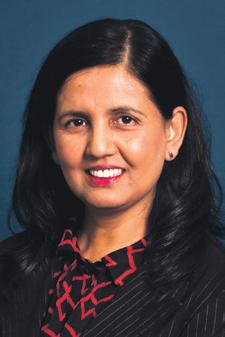
In another amusing anecdote, Mr Sharma described how his marriage with his wife Ambika was arranged. The match maker, a woman known to both families, would say to his folks, “Ladki wale taiyaar hai, tum log ke taraf se deri hai ... (the girl’s family is ok with the match, only you are delaying the process)”. To Ambika’s family she would say; “Ladke wale taiyaar hai, tum log ke taraf se deri hai ... the boy’s family is ok with the match, only you are delaying the process.”
Now, Sharma refers to his wife as his “rock of Gibraltar”, claiming he owes his success to her, who stood by through all their challenges of poverty, dealing with grief, the political crises when he was locked away for six days during the military coup, and relocating to Australia.
The couple has three children and several grandchildren.




The presidential election, if it takes place,
Cr Kalam out of presidential fight, BJP, Mamata red-faced
Former president A.P.J. Abdul Kalam opted out of the presidential election after studying the “totality” of the situation, dealing a blow to the BJP and Trinamool Congress leader Mamata Banerjee who badly wanted him to take on Pranab Mukherjee.
His decision spiked what could have been a high-profile battle between him and Finance Minister Mukherjee, who appears set to occupy the Rashtrapati Bhavan as the United Progressive Alliance (UPA) nominee.
The Bharatiya Janata Party refused to comment on Kalam’s decision, but a meeting of the party’s top leaders decided the party should put up a “symbolic” fight against Mukherjee and discussed former Lok Sabha speaker P.A. Sangma as a possible opposition candidate.
Banerjee, though, expressed “hurt” at Kalam’s decision, and said he had “touched our hearts and our spirit.” cleaning the river in patches all across the country but it feels this is not enough. The entire stretch has to be given a facelift - at one go if possible.
Describing the former defence scientist as “people’s president”, Banerjee said she had “unshakeable” faith in the people of the country, who will “rise to cleanse Indian politics and bring back honesty, values and ethics” that the former president represented in public life.
But that decision of Kalam virtually brought the Trinamool to the threshold, and there was all indication that the party would break away from the UPA.
Though Sudip Bandhopadyay, a central minister from Trinamool, denied the six ministers from the party had submitted the resignations from the government to Banerjee, he also claimed that they were “mentally prepared” to quit as and when the party supremo takes an “appropriate decision” at the “appropriate time”.
With Kalam - who was the president in 2002-07, not joining the race, the BJP said it will meet again to decide whether it should back Mukherjee or support Sangma, the joint candidate of the AIADMK and Biju Janata Dal.
Breaking his silence since his name began doing the rounds as a possible presidential candidate, Kalam, 80, said many politicians and others wanted him to contest.
“Though I have never aspired to serve another term or shown interest in contesting, Mamata Banerjee, other political parties wanted me to be their candidate,” he said in a brief statement.
“I am really overwhelmed... This being their wish, I respect it. I want to thank them for the trust they have in me.
“I have considered the totality of the matter and the present political situation and decided not to contest the presidential election,” he said.
Informed sources said Kalam conveyed his decision first to BJP leader L.K. Advani, who telephoned him twice requesting him to contest in July against Mukherjee.
Sudheendra Kulkarni, a former aide to Advani, met Kalam twice in a bid to persuade him to take the plunge.
But Kalam, who had also consulted close friends, eventually decided not to join the race, perhaps realizing that his chances of winning were near nil.
Unlike in 2002 when he enjoyed near universal support barring the Left, this time even some sections of the BJP-led National Democratic Alliance were not eager to field him.
Political observers said the decision was embarrassing for the BJP and Banerjee as they both rooted for Kalam without even consulting him.
The Rashtriya Swayamsevak Sangh (RSS) was also for Kalam.
In Patna, Bihar Chief Minister Nitish Kumar (JD-U) said there should be a free and fair discussion in the NDA meeting.
“We are in favour of consensus (on the president poll) but how will there be a consensus unless NDA itself comes up with a consensus? Efforts are on to build a consensus,” he said.
What came as a surprise was BJP MP Maneka Gandhi meeting Mukherjee. After her meet, she said she wants consensus on the president.
“It will be a hugely challenging task, but this is our dream,” explained Kedar Prasad Dubey, a former State Bank of India officer who is one of the key persons involved in the project.
Dubey said the survey would find out the number of ghats along the river, the extent of pollution and the number of volunteers needed for what would be an unprecedented enterprise.
“We will also create public awareness on the necessity to keep the Ganges clean and litter-free,” Dubey said recently.
The Ganges originates at Gangotri in Uttarakahand, at a height of 12,769 feet above sea level. It passes through Uttar Pradesh, Bihar, Jharkhand and West Bengal states in India before entering Bangladesh where it flows into the Bay of Bengal.
The Ganges basin is the most heavily populated river basins across the world, with over 400 million people and a population density of 390 people per square kilometre.
The river is also one of the most polluted in the world, threatening not only humans but also over 100 fish and 90 amphibian species.
The government’s Ganga Action Plan is widely considered a failure, angering many Hindus who worship the river as a goddess and are upset that the authorities do not seem to be bothered.
The Gayatri Parivar, Dubey said, has rich experience in cleaning rivers as well as temples. On June 5, some 2,500 activists joined hands to clean the Ganges at Haridwar. On May 31, more than 2,000 men and women teamed up to clean all 10 ghats in Varanasi in Uttar Pradesh.
Earlier that month, about 5,000 people took part in cleaning the river Saryu in Ayodhya, also in Uttar Pradesh.
Thousands of Gayatri Parivar members and others clean the 615-km Tapti river (which flows from Betul in Madhya Pradesh to Surat in Gujarat) every month, Dubey said.
Similarly, while the Narmada river between Madhya Pradesh and Gujarat is cleaned every two months, a similar cleaning operation takes place for the Shivana river in Mandsaur district in Madhya Pradesh, he said.
In every campaign, out came tonnes of waste and litter that should have never been dumped in the rivers in the first place: old clothes, polythene and plastic, footwear, bottles, rotting food, even animal carcasses.
“It is so sad that people have no respect for our rivers,” Dubey said.
One of the biggest clean-up operations by Gayatri Parivar took place at the famed Rameswaram temple in Tamil Nadu in January 2011 when 650 people from 11 states gave the shrine and its surroundings a thorough wash.
“I too was there,” Dubey said. “We formed human chains and took out 25 tractor-trolley loads of garbage from the temple area and four times more than that from surrounding areas.
“Our people feel that it is high time both the banks of the entire Ganges was cleaned,” he said. “That’s what we want to do.”
Fiji is new hotspot for Indian movies
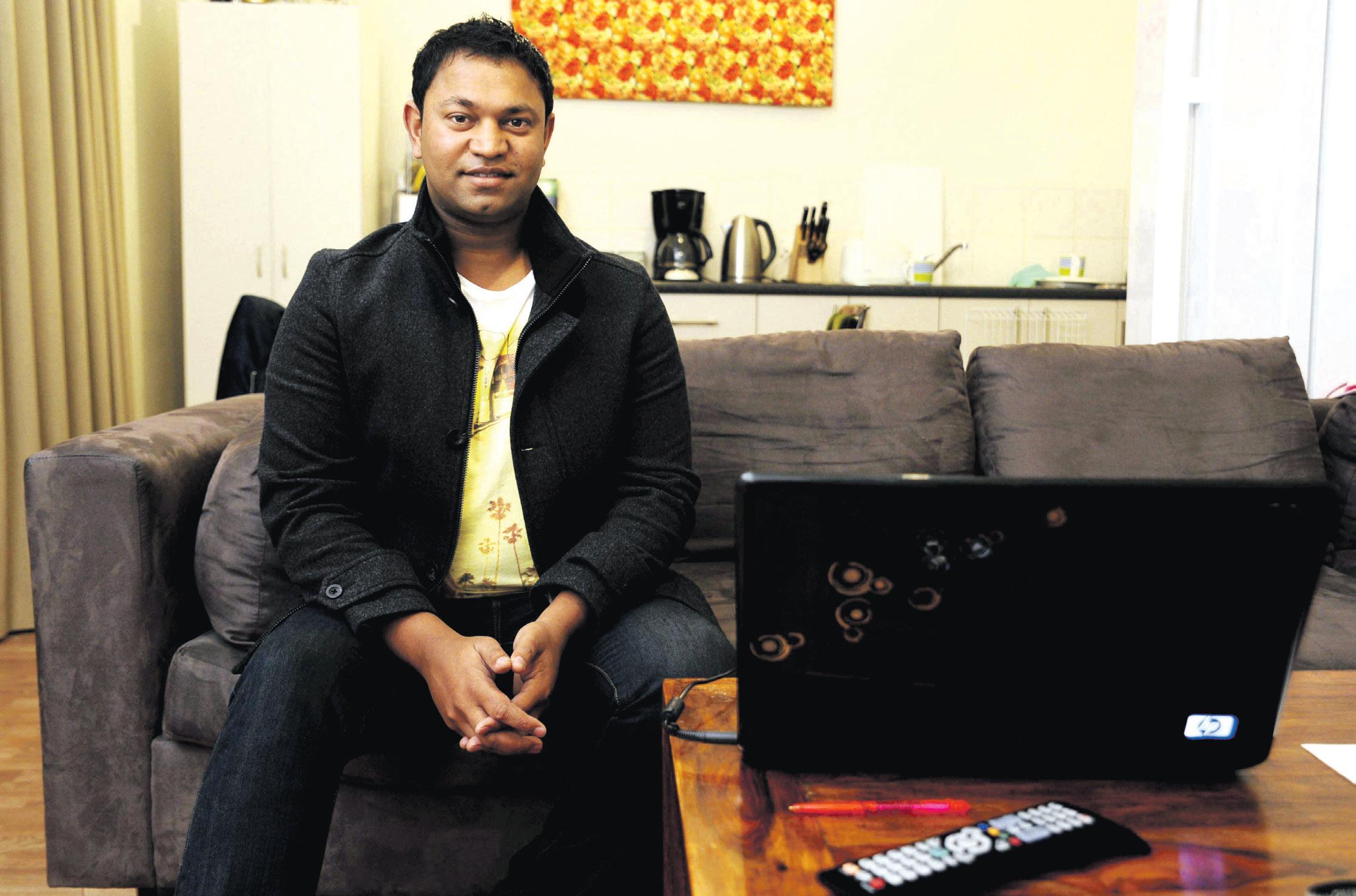
The Fiji islands are emerging as the latest hotspot for Indian films, with three movies, 3G, Warning and Ammali Tumaali, being shot in the picturesque
South Pacific island locales in less than a year.
Neil Nitin Mukesh’s new film 3G began shooting in Fiji in mid-May. It has been followed by Anubhav Sinha’s new venture titled Warning, which held its muhurat shot earlier this week in Nadi town.
Anubhav Sinha, who directed the Shah Rukh Khan produced movie Ra One, has begun his debut movie as a producer without any major film stars. Warning is billed as a big-budget horror movie, which is being filmed in Fiji and New Zealand. It has already recorded a song by Bangladeshi pop singer James, who had sung the popular number Bheegi bheegi in Gangster - A Love Story
The Fiji Islands have several advantages for film shooting aside from the measures undertaken by the Fiji government to attract film producers. They offer a variety of scenic locations from aquamarine seas, coral reefs and sandy beaches, lush tropical greenery and rocky hills, coconut groves and sugarcane fields together with a population of Indian origin, who number about 37 percent of its 900,000 population, for street scenes.
Captivated by the islands, Sinha tweeted: “Serene morning from my window on the first day of the shoot.”
The scenic beauty of Fiji provides a stark contrast for chilling horror films and both the films being currently shot in Fiji are horror films.
3G is described as a supernatural horror film. It has Neil starring opposite Sonal Chauhan and is co-directed by Sheershak Anand and Shantanu Ray Chibber.
The film is being shot in a 50-day shoot that involves some stunts and spine chilling sequences. Some of the film sequences have been shot in the luxurious Denarau beach resort and in Suva and Sigatoka town. One special scene has been shot on a lake surrounded by thick forest - a location that was made famous by Anaconda, which was shot around that lake.
Tamil film Ammali Tumaali, produced by Gemini Industries and Imaging, Chennai, was the first Indian film to be shot in Fiji Islands late last year.
Directed by K.S. Adhiyaman, Ammali Tumaali features Swati Reddy, Shanthanu Bhagyaraj and Nakul Jaidev. A love story involving three friends with a lot of local colour, the film was shot in Coimbatore, Andaman Islands and Fiji.
The producers of Ammali Tumaali were the first film company to utilise the special concessions offered by the government of Fiji for making commercial cinema in Fiji.
The Fiji government provides a 47 percent tax rebate to fully funded overseas film productions as a means to encourage film producers to use the enormous potential of the islands. The government expects that the use of Fiji locales in Bollywood films would generate more tourism for Fiji just as it did for New Zealand and Australia some years ago.
Australia looks at Kerala for collaboration in agro-based services
Australia has welcomed the Kerala government’s ‘Emerging Kerala’ 2012 Global Connect initiative and expressed its desire to partner the state in agri and agrobased services and other sectors.
This was disclosed at a high-level meeting where an Australian diplomatic delegation led by High Commissioner Peter N. Varghese called on Chief Minister Oommen Chandy, senior ministers and officials to discuss the possibility of new trade and business partnerships.
Another sector in which the Australian delegation expressed its desire to cooperate with the state is deep-sea fishing projects.
They have offered services, including in training fishermen and promoting of sustainable, environment-friendly practices, to boost the agriculture industry’s contribution to the state economy.
Varghese told Chandy that he would make the private industries in his country aware of the ‘Emerging Kerala’ programme that will be held in Kochi Sep 12-14 this year.
Kerala Industries Minister P.K. Kunhalikutty said the response from Australia to the Kerala government’s efforts has been very positive.
“Our meeting clearly showed the great synergy of ideas we have. There is so much Kerala can offer that Australia wants, and vice versa,” said Kunhalikutty.
Another area where the delegation expressed its wish to collaborate is in improving technical education in schools and ITIs through projects similar to the ones it has already completed in Maharashtra and Karnataka.
Among the mega projects that have attracted Australia’s attention are the proposed Oceanarium and LNG terminal at Kochi.
“Australia has some of the world’s best aquaria and oceanaria. It is also a country with very large reserves of natural gas. They are naturally interested in sharing their technology and resources for the projects that leverage their strengths,” said Alkesh Sharma, who is also managing director of Kerala State Industrial Development Corporation (KSIDC). This is the nodal agency for the mega ‘Emerging Kerala’ event.
Saina wins third Indonesia Open title
India’s Saina Nehwal got a big shot in the arm ahead of the London Olympics as she saved two match points before beating Li Xuerui of China to win her third Indonesia Open title in four years in Jakarta recently.
The World No. 5 upstaged the reigning All England and Asian Champion 13-21, 22-20, 21-19 after a tantalisingly close match for her maiden Super Series Premier crown and second in as many weeks following the victory at the Thailand Open Grand Prix Gold event in Bangkok this month. For the Chinese, it was her first loss in five straight finals and first to Saina in two years, making the head-to-head record 4-2 in her favour.
With the win, the Hyderabadi continued her love affair with Indonesia where she won back-to-back titles in 2009 and 2010 besides reaching the final in 2011.
“I just love coming here. I get great crowd support and I feel like a champion every time I step on the court,” said Sania of the tournament which was awarded Super Series Premier status from Super Series tag last year and is at par with the prestigious All England Championships.
The final lasting 1 hour 5 minutes provided a great spectacle to the badminton fans with both players indulging in long rallies ending with power-packed smashes.
Saina was at the receiving end before pulling off a memorable win.
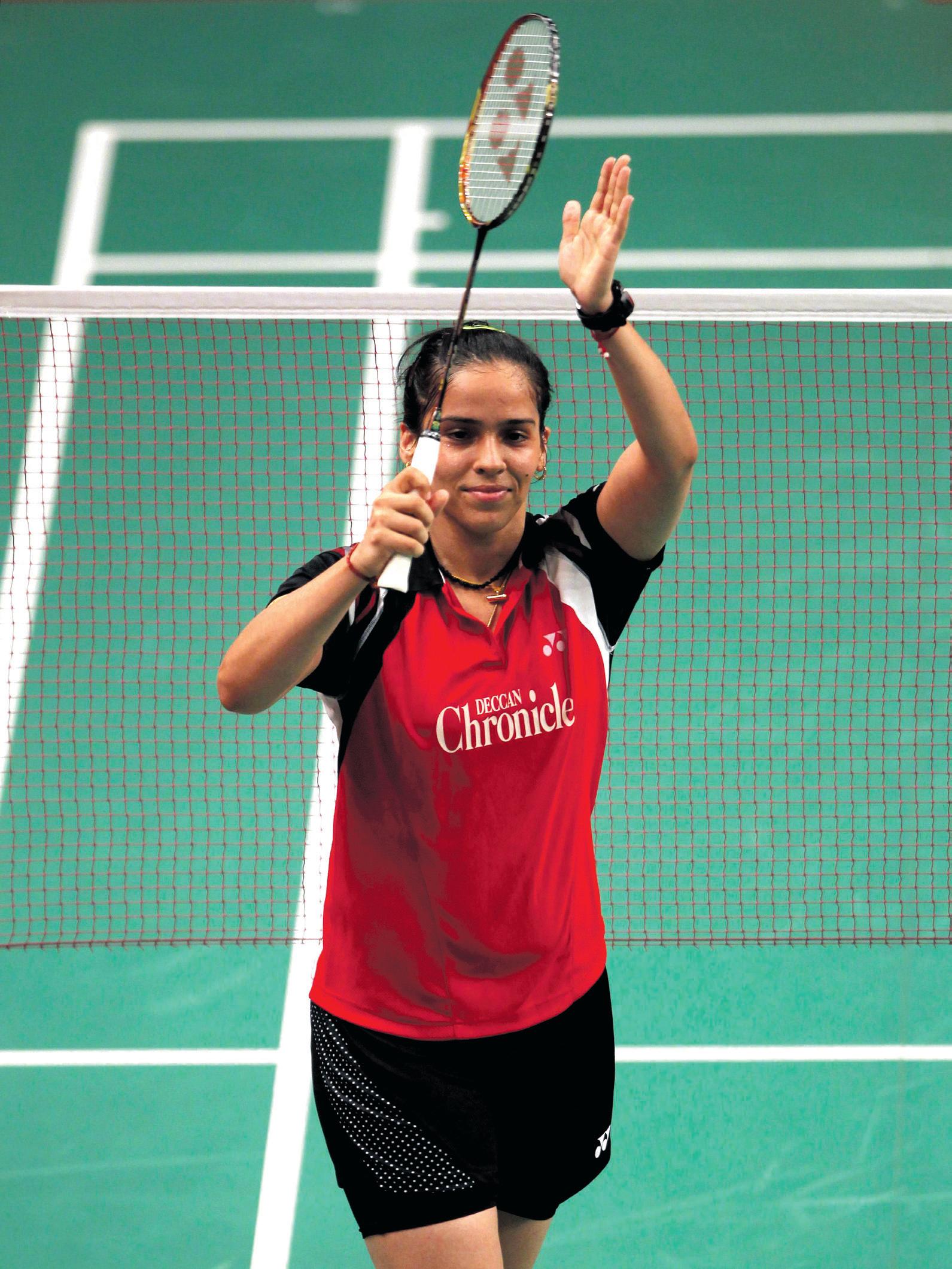
She looked out of sorts in the first game and posed little resistance against her opponent’s down the line smashes and crafty net play. Li was one game up 15 minutes into the contest.
The Indian, realising the need of a change in strategy, attacked more in the second and gained a 13-8 cushion. That was when Xuerui’s fighting capabilities came to the fore as cut Saina’s lead to 13-12 and then went on to take six straight points from 14-18 to secure two match points. Saina, however, managed to regain her composure to level the match.
The decider had everyone on the edge of their seats with Saina trailing 10-11 at the mid-game break. Saina, however, did manage to maintain a slender lead from there on. Unforced errors started to creep in from Li’s racquet and Saina earned crucial points by attacking more on the body and was ahead 19-16. The 22-year-old did not squander the advantage this time around and shut the door on her opponent with a forehand winner.
A couple of net cords going either way added more excitement towards the finish.
Saina pocketed $48750 as prize money while Xuerui received approximately half of it.
Indian-American businessman joins Georgia Senate race
Indian-American entrepreneur Bikram
Kumar Mohanty has been chosen as the candidate of President Barak Obama’s Democratic Party for Georgia state’s Senate elections slated later this year.
Migrating to the US in 1994 from Chandbali in Odisha’s Bhadrak district, around 110 km from Bhubaneshwar in Orissa, Mohanty, 45, is the founder and chief executive officer of Innovative Rehab Solutions - a health care company based in Georgia’s Valdosta city.
“As a student, I got the opportunity to serve in the Missionaries of Charity as a clinical intern. I truly believe my skills and commitment would help create jobs in south Georgia,” Mohanty said in an email interview.
The Indian-American entrepreneur said he was appointed to the ‘White House Conference on Aging’ as an alternate delegate from Georgia in 2005. He has also served in Lowndes County Chamber of Commerce from 2002-2003 and as the licensure liaison to the Georgia State Board of Occupational Therapist.
Mohanty set up the Mother Teresa
Foundation, a non-profit organisation, to raise awareness about health care and disease prevention issues among lowincome and homeless Americans.
The elections to the Georgia state Senate will be held July 31 and November 6, he said. “Mohanty is the first person from Odhisha to run for a state senate in the US and we are proud of him,” said Dhirendra Kar, former president of the Orissa Society of the Americas.



